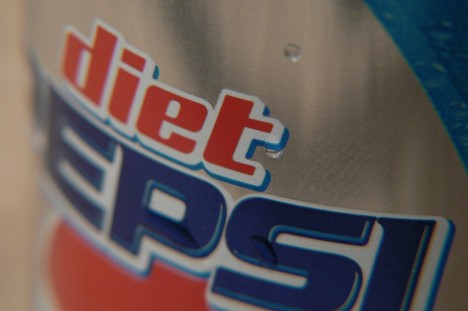
(CC BY-SA 2.0) Terry Ross/Flickr
There was a dramatic development in the world of Big Soda last month. PepsiCo announced the first major reformulation in its Diet Pepsi brand in some thirty years. As of August, the company will replace the artificial sweetener aspartame with the artificial sweetener sucralose.
The change is not being made for purposes of improving the beverage’s nutritional content, which will remain approximately zero. And it’s not being made because the Pepsi people think aspartame is harmful. Pepsi has always claimed it to be utterly benign, and the federal government has the company’s back on this: according to the Food and Drug Administration, aspartame has been the subject of more than 100 studies that have repeatedly found it to be quite safe (unless you have the rare hereditary disease phenylketonuria), and reports from the Department of Agriculture say the same thing. No, the change is being made for a more fundamental reason than nutrition or health. Revenues. Profits. They are seriously off. Diet Pepsi’s U.S. sales have been sliding since 2005, and the slide has been steepening lately, down a jarring 5.2 percent last year alone. And it’s not just a Pepsi thing, it’s a broader diet drink thing: Diet Coke U.S. sales began sinking a year after Pepsi’s, and were down an even more stunning 6.6 percent last year, and another 5 percent in the first quarter of this year.
Perhaps because Diet Coke is still the top-selling diet soda, and because the global diet soda market is expected to continue growing, Coca-Cola is sticking with aspartame in Diet Coke. But, while it won’t yet join PepsiCo in tinkering with the recipe, Coke agrees that aspartame is what’s killing their diet soda sales. Big Soda is convinced that the public is specifically rejecting the sweetener, at least in diet drinks.
Twitter users fear Aspartame
I must confess to being caught off guard on this. I haven’t heard or read anything in the health media, or even the general media, that indicates any widespread concern about aspartame or its commercial renditions, Equal and NutraSweet. Some studies have produced a few troubling statistical associations with diet sodas in general: in one, daily diet soda drinkers were 43 percent more likely to suffer heart attacks and strokes than nondrinkers, and in another, 67 percent more likely to develop type 2 diabetes.
But the studies don’t distinguish between aspartame and sucralose (the sweetener in Splenda), and they’ve hardly gotten the major media coverage that, say, gluten and trans fats have. Moreover, both the pro- and anti-artificial-sweetener camps agree that the two products are equally safe or toxic, depending. On that basis, Pepsi’s switchover seems rather rash, if not indeed pointless.
So why have PepsiCo’s corner-office execs decided that aspartame-rejection is so responsible for their sales woe that they’ve chosen to replace it? Because there are actual numbers to back them up. Beverage Digest, a leading industry publication, ran some programs to track Twitter attitudes nationwide using a 1-to–100 point scale of favorability. On this scale, Christmas, for example, pulls a ranking of 88. Aspartame, in stark contrast, gets a 22. How negative is that? Better sit down – Congress scores a 38.
It could become the gluten of beverages
So convincing was this alarming statistic for the folks at Pepsi that the new sucralose-sweetened Diet Pepsi cans will feature the reassuring label, “Now Aspartame Free.” And perhaps this will reverse Diet Pepsi’s fortunes and sales curve. Or perhaps not. The suits as PepsiCo seem to know their market, but I have a different theory.
To wit: A lot of people who drink diet colas and other diet soft drinks do so because they consider them to be healthier, or at least less unhealthy, than the sugar-sweetened versions. Fewer calories, less tooth decay, little advantages like that. And my suspicion is that most of the decline in sales may be because those people, who once switched from sugary sodas to sugar-free sodas out of concern for health, are now switching from sugar-free sodas to things like fruit juice or water out of the same concern. I think that those people have decided, and are continuing to decide, that liquid crap which is relatively harmless is still liquid crap, and that maybe it’s time to move on from that beverage option to something more beneficial. O.J. Lemonade. Tea, even.
It will be interesting to see the sales figures at PepsiCo after the August changeover. Perhaps I’m wrong and they’re right, and Diet Pepsi sales will pull out of their dive and begin climbing once again. Perhaps sales won’t continue to plummet for all diet soft drinks regardless of ingredients, as millions abandon them for healthier beverages, until Big Soda profits tank and high-level execs by the dozens wander the streets, unemployed, disgraced, their careers shattered, riddled with remorse.
But I can hope, can’t I?
(Earlier: “Yep, Even 100-Percent Fruit Juices are Packed with Sugar” by Karen Collins)

By Robert S. Wieder, CalorieLab’s Senior Health Columnist since 2006. Author of several books, including 115 Reasons Why It’s Not Your Fault You’re Fat, Bob wrote for numerous national magazines after starting out as editor of the UC Berkeley humor magazine the California Pelican. He also put in a stint as a San Francisco-area stand-up comic.
Diet Pepsi Looking to Kick Some Aspartame is a post from:
SOURCE: – Read entire story here.




